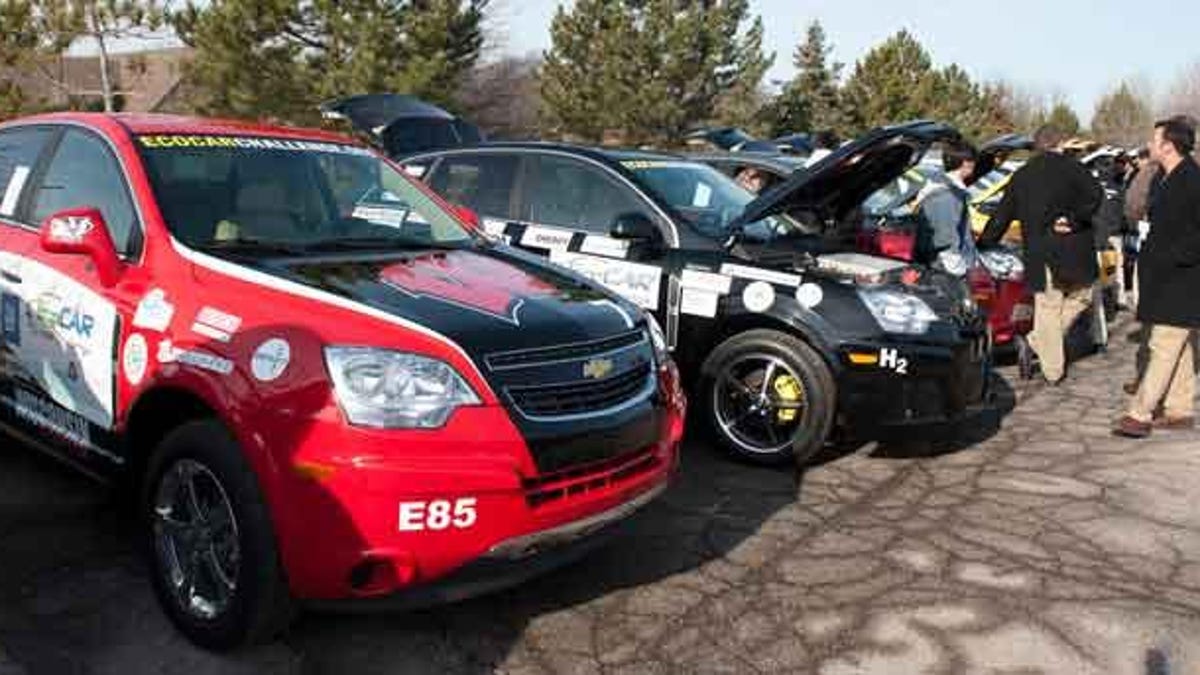Contest revs up new technologies
Automotive News reports on the EcoCar competition, which challenges college teams to develop alternative-fuel vehicles.

ANN ARBOR, Mich.--Fuel-cell vehicle developers usually say they are building electric vehicles that draw power from hydrogen, not a battery.
But not always.
At the EcoCar competition ride-and-rive here, two groups of engineering students displayed fuel cell plug-in hybrids. The vehicles carry both a fuel cell stack and a battery.
It's one of the new-tech systems developed by 16 college teams in the three-year competition, sponsored mainly by the U.S. Department of Energy and General Motors, which donated vehicles. The vehicles were shown at the EPA's National Vehicle and Fuel Emissions Laboratory here.
The teams have devised a range of alternative power trains to meet the California Air Resources Board's zero-emissions vehicle regulations. The vehicles include ethanol- and biodiesel-powered hybrids and range-extended EVs.
'Acceleration is amazing'
Kevin Martin, team leader for the Missouri University of Science and Technology in Rolla, Mo., says his team can cut the necessary fuel cell stack capacity in half by backing it up with a battery. That allows the fuel cell stack to run at maximum efficiency at all times, he says.
"We let the battery take the peaks and valleys," Martin says. "If we need extra power, we can pull it from the battery."
That's particularly valuable during acceleration--"The acceleration is amazing," he says--when the power train pulls energy from both sources.
Martin says the university has a lengthy history of hydrogen power research. The university has the only hydrogen refueling station in Missouri, he says, and has a hydrogen vehicle development lab. Those factors influenced the team's choice of power trains, he adds: "When we got into EcoCar, we said, 'We have the station, might as well build the car.'"
The EcoCar contest seeks to nourish that adventurous spirit, says Patrick Davis, Department of Energy program manager for vehicle technologies.
"Our whole motive for doing this is training the work force that's required to introduce these technologies into the industry," Davis says.
Real-world standards
One key element is to meet real-world standards. The teams use an engineering process modeled after GM's global vehicle development process, for instance.
Likewise, the teams were at the Ann Arbor emissions lab so that their vehicles could undergo the same emissions tests as production vehicles. The vehicles also have been tested for safety and greenhouse gas impact.
The competition is managed by the Argonne National Laboratory. Teams are in the third year of the competition, with a winner to be chosen after final competition in June.
GM's liaison to the challenge, hybrid development lead engineer Aaron Sullivan, notes that teams are also judged on packaging--getting all the high-tech gear into a vehicle interior that still might appeal to consumers.
Participating students are highly recruited, he adds.
"We're staffing up with these young men and women," Sullivan says. "A lot of these students come out of this program and go right into our hybrid organization."
(Source: Automotive News)